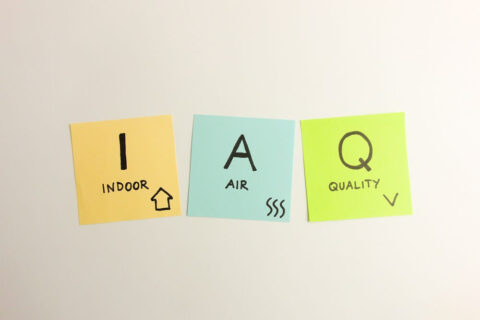Pollution Linked to Heart Disease
Important Facts About Air Pollution
It’s been said that the air inside our homes and offices is often much more polluted than outside air. You might realize this if you suffer from asthma or allergies and notice that some buildings tend to trigger your symptoms. What you may not know, though, is that air pollution has been linked to cardiovascular disease.
Understanding Cardiovascular Disease
The leading cause of death in the United States, cardiovascular disease affects one in three Americans, killing one person every 40 seconds. Most of the time, heart disease happens when plaque builds up in the walls of the arteries, resulting in blood clots that can block the flow of blood and lead to stroke or a heart attack. We’ve long known of risk factors like being male, older, smokers, with increased blood pressure, high total cholesterol, and low HDL. Now, a large body of research has shown that air pollution can not only exacerbate existing cardiovascular disease but can also contribute to the development of disease.
Note: the risk of an individual developing cardiovascular disease from exposure to air pollution is not as high as the risks attributed to the other, previously mentioned factors. However, research from the EPA has found that exposure to fine particulate matter, with diameters less than 2.5 µm (PM₂.₅), can increase the risk of cardiovascular issues in the population as a whole. Both short and long term exposure has been found to cause an uptick in hospitalizations for serious problems like coronary syndrome, arrhythmia, heart failure, stroke, and sudden cardiac death. The risk is higher for people with established heart disease.
The Science Backing Up this Risk
Multiple studies have shown the connection between air pollution and heart health, including one decade-long study from the EPA’s STAR grant program at the University of Washington. This Multi-Ethnic Study of Atherosclerosis Air Pollution (MESA Air) found a direct link between air pollution and atherosclerosis, the buildup of plaque in the coronary artery that impacts heart health. Another finding is that long-term exposure to particulate matter and nitrogen oxides at levels near the National Ambient Air Quality Standards (NAAQS) cause blood vessels to age prematurely, as well as contributing to rapid calcium buildup in the coronary artery. When calcium builds up, it can cause blood flow to the heart and other major blood vessels to be constricted, which increases the likelihood of heart attack and stroke. While there have been studies before linking heart disease and air pollution, this has the most extensive length, diversity in subject participants, rigorous data collection, and definitive scope.
What is Particulate Matter?
Particulate matter (PM) is the mixture of solid particles and liquid droplets in the air. Some of these particles, like dust, dirt, soot, and smoke, are large enough to see without assistance. Others can only be seen with an electron microscope. PM₂.₅ refers to fine, inhalable particles, with diameters of 2.5 micrometers or smaller. To understand how small a micrometer is, think about a single strand of hair. The average hair is 70 micrometers in diameter- 30 times larger than the largest fine particle.
Sources of PM₂.₅ are varied. These particles can be made up of many different chemicals, and come in a wide array of sizes and shapes. Construction sites, unpaved roads, fields, smokestacks, and fires emit PM₂.₅ directly, while particles sometimes form because of chemical reactions in the atmosphere. Particle pollution is a problem, because these tiny particles can linger in the atmosphere for an extended period of time, sometimes traveling hundreds or even thousands of miles, impacting air quality far from their original source. You’re at risk of breathing in these particles near busy roads and industrial areas, near fire, and on hot, humid days when the weather is stagnant. You’re also exposed to PM₂.₅ if you smoke, or if you are in the presence of second-hand smoke.
Fighting Pollution in Our Homes
The standard advice on lowering your risk of heart disease is to exercise more, eat a more nutritious diet, and quit smoking. But what about air pollution exposure? There’s only so much you can do to avoid pollution in the outside world. You can stay indoors on poor air quality days, wear a mask in places where you feel at risk, keep your doors and windows shut, and run your air conditioning, but your home has poor indoor air quality, it won’t do much good. Fortunately, there is quite a lot you can do to improve your indoor air quality. Start with indoor air quality testing, to determine which pollutants are in your air. Once you’ve had a home air quality test, you can take steps to improve your air quality and possibly your health.
HVAC Experts can Help
To rid the air in your home of pollutants, start with a better filtration system. HEPA filters can go a long way but talk to your heating and cooling company about ways to improve your filtration further. Then consider measures like a whole house dehumidifier, to balance the moisture levels in your house, a ventilator, to bring in clean, fresh air from outside without the pollutants that can come in through screens, and a UV air scrubber, to destroy viruses and bacteria inside your HVAC system.
Improve Your Air Quality with Barstow and Sons
When you’re ready to improve your indoor air quality, contact Barstow and Sons for help. We understand the importance of good indoor air quality, and we can protect you and your loved ones with solutions that include humidifiers, UV air scrubbers, improved air filtration, and ventilators. A full-service heating and cooling service company, we’ve been providing high-quality service to customers throughout Anne Arundel County, Severna Park, Pasadena, and Annapolis since 1980. We’ve built a reputation for our dedication to excellence, and we’re here for our customers 24 hours a day, 7 days a week. Call (410) 777-9148 to learn more or contact us through our website.



